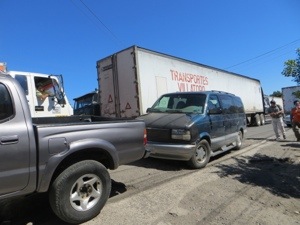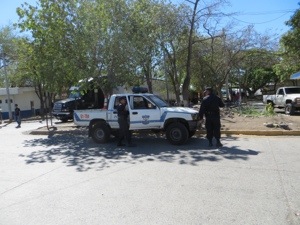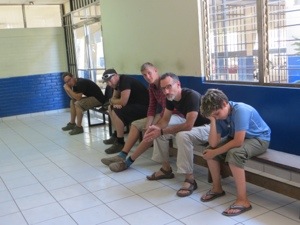The idea of a Jewish community in Armenia is not so very far-fetched. Unless, that is, you are talking, not about the country in the Caucasus, but rather the town of Armenia, El Salvador. This pleasant town of 24,000 residents, not far from San Salvador, has a tiny, isolated Jewish community of about 90 people. Most are descendants of Jews forcibly converted to Catholicism during the Inquisition, and some are Jews by choice. One of our goals, from the outset of the trip, was to visit the community of Armenia.
At the Hostel Mama y Papa in El Bosque El Imposible, we met Daryl, a young Australian Jew, who expressed an interest in the community of Armenia. When we met up again with him and his traveling companions (Fabian from Switzerland and Mike from Denmark) in the foodie town of Juayua, we invited them all to come with us on a day trip to Armenia.
We left bright and early at the crack of nine the next morning. Armenia is only about 50 kilometers from Juayua, so it was entirely feasible to travel there with all six of us crammed into the four and a half seats of the van, visit for a bit, and then get back to our hotel before dark. We’ve taken to planning our travel pretty carefully, because the most recent problem with poor Rocinante is with the temperature sensor in the fuel pump; when the gas tank gets too hot–after, for example, traveling for too many afternoon hours on hot tarmac–the fuel pump thinks the engine is overheating and it shuts off, causing the car to stall. Therefore, we travel mostly in the morning, and not too far in any given day. And we always park in the shade.
We glided down the mountain from Juayua, past booths selling wickerwork, with three of the Salvadoran volcanoes in view. We arrived at the junction town of Sonsonate in good time. The rest of the trip was all along the flat on good roads, and went very smoothly. We saw a sign that read “Armenia: 5 k” (and also, interestingly “Lourdes, 13 k”). Yay! we were almost there.
Up ahead was a police check point. We see these regularly throughout Central America, and have almost never had any kind of difficulty. The first (and until today, only) problem we had was a 1000 peso ($75) bribe we paid in Mexico. The problem was this: because of the Canadianness of the seller, our car is registered in British Columbia. BC, unlike anywhere else I know, uses the original purchase agreement signed over to the current owner in place of a title document. In other words, we have legal paperwork showing that we own the vehicle, but it doesn’t look “official.” The policeman in Mexico claimed it was not, therefore, official, and was prepared to write us a citation which would, he said, cost us 2000 pesos and require us to spend the night in the town–a town so undistinguished I can’t remember the name of it–possibly in jail. Unless, of course, we just gave him 1000 pesos. Which, of course, we did, after which he was all smiles and handshakes, and wished us the safest and happiest of journeys.
We learned two things from our Mexican experience. First, we should never admit to speaking much Spanish at all at a checkpoint; it makes it too much trouble to explain to us what they want in terms of bribery, so they give up before they start. Second, we needed better-looking paperwork. At our next stop, we created a very official-looking certificate of title from the Province of British Columbia, with the state seal and the VIN of the car, and Henry’s name. It has worked like a charm everywhere. Police, customs officials, immigration: everyone accepts it. We’ve never had a single problem with it since then. (And we’ve only been asked once why our car is registered in Canada while our passports are from the US. We simply said that we live very near the border, and the customs official just grunted and stamped our passports.) Thank you, Photoshop!
But back to the present day, where we are at the police checkpoint only four kilometers from Armenia. We were waved over. We pulled to the side of the road. Before Henry rolled his window down, I said, “Remember, we don’t speak much Spanish!” “I can probably help you with that,” Fabian said. “Nooooo,” we said in unison, “We.Don’t. Speak. Much. Spanish.” “Ah.”
The police asked for Henry’s license, which he handed over. (I should add that, on the advice of another traveler, I made laminated copies of our drivers licenses before we left home, so as not to release actual documents unless asked. It was one of these that Henry volunteered.) Then they asked for our customs certificate for the car. We pulled out the notebook in which we keep all our important documents, and then remembered: there was no paperwork coming into El Salvador. We crossed from Honduras to Perquín, in the western mountains, and had the easiest, most pleasant border experience, almost as pleasant as going to Canada in the old days. Everyone at the border was very friendly and helpful; they examined our passports, took a casual look in the back of the van, and waved as we pulled away. We had assumed that they knew what they were doing, and naturally, we didn’t request more paperwork than they offered. Apparently we should have.
The checkpoint police were not happy. We searched through all the documentation for the car, and through our passports, and couldn’t find anything at all about our entry into El Salvador. They looked over our shoulders, murmuring “No, es de Guatemala,” “No, es de Honduras” as we leafed through the papers. They assured us there was no problem with our passports, but insisted they needed the customs document. There were five different policemen at the checkpoint, and at various times each one came over to the car to ask us again if we were sure we didn’t have it. We had, by now, given up on not speaking Spanish, and were doing our darnedest to explain and understand.
They asked us to wait. We weren’t supposed to be on the road at all, apparently, without the customs paper; they were trying to phone their superiors for instruction, but this was complicated by the fact that it was Sunday and no one could figure out what to do. All five of them milled around, variously on cellphones, sitting in the police truck, or waving over other motorists for a brief check.
We sat in the car. Now, remember that there are six of us: Joe and I sharing the passenger seat and the three young men–each one well over six feet tall–crammed into the back bench seat. We never turn the engine off at a checkpoint, so that we can leave immediately. But after a half hour, it was clear that we weren’t going anywhere any time soon. Henry turned the car off, and we made ourselves comfortable. Our hopes of reaching Armenia dwindled by the minute.
One of the policemen ambled over to the car, and asked me, in a friendly way, to explain how we were all together. I said, again, because most of what I said at any point needed to be repeated at least once for a different policeman, that Henry, Joe, and I were a family, and that the other three were friends that we had met recently. He asked for their passports, and here we met with another glitch–none of them were carrying a passport, having left them in the hotel for safety. This was met with concern and scolding, but no definitive punishment; however, it added to the overall irregularity of the situation.
After about an hour of waiting, and at least four different cellphone consultations, the police determined that we needed to drive to the customs headquarters in San Salvador, over 40 kilometers from the check point. I explained that because we were staying in Juayua, we would need to go back there afterwards, and that our car was having troubles and might not make it. I promised that we would go tomorrow to get the paperwork, and that we really would do it, because we didn’t want to drive around without it either.
“No. Hoy.” the policeman (whose name turned out to be Eric) said, very firmly.
I then objected that we wouldn’t be able to get through the city, get the document, and get back to Juayua before dark; there was no way, I said, gesturing to Joe, that I was going to drive through the mountains after dark with el pequeño.
“Hmm. She has a point,” one of the police said. “That wouldn’t be good.”
They consulted among themselves more, heads together over our tourist map of El Salvador. After much discussion, they came back with a new plan. They would escort us to the Guatemalan border at Hachadura, on the coastal highway, CA 2.
“That’s even farther than San Salvador!” I said, adding up the distance markers on the map. “Look–it’s at least 80 kilometers to Hachadura!”
“No, really?” said a policeman, taking the map and checking it himself. “She’s right, it’s pretty far.”
“Yes, but the road is very flat and smooth.” said another policemen. “We go there all the time; it’s a quick trip. We’ll escort you back to Juayua so you’ll be safe.”
A couple of the policemen reminded us that they held Henry’s drivers license and the title to the car as surety, and instructed us to follow them them to the border. (It was good to know that our handiwork was so convincing, but of course we planned to do as told in any case. All five of them had great big guns.)
It was clear that we weren’t going to get out of this. But since we were backtracking toward Sonsonate, I asked if we could drop Daryl, Mike, and Fabian, so they could catch a bus back to Juayua. After another round of discussion and consultation, they decided that would be okay.
We squeezed back in the van. The police picked up their orange traffic cones and tossed them in the back of their pickup, all five of them piled inside, and they pulled out with us following. We were headed the wrong way, so at the first opportunity to turn around, all four of the police who had window seats stuck their arms out, two with the traditional left turn signal, one with a bent-arm left signal from the right side of the car, and the fourth signaling a “blinking light” by opening and closing his hand. We made the u-turn perhaps two kilometers from our goal.
I had requested that we stop for a bathroom break, but as the police led us past two gas stations without stopping, it appeared they had forgotten. We pulled into the next gas station and watched the police truck drive off down the highway. By the time I was done, though, they had circled back around and come back to get us. Darn.
Quite soon, we arrived at Sonsonate, and the police pulled over at a bus stop. Daryl, Mike, and Fabian were all set to jump out and hop on a bus, headed, if not for Armenia, for a short ride back to the comfort of the hotel. Ha. The police had been discussing the situation during their drive, and had come to the conclusion that it wasn’t safe (they said) to just leave them at the bus stop, and that the three guys needed to come for the whole trip. Why it wasn’t safe to leave three grown men at a bus stop in broad daylight on a Sunday in a provincial town, we never learned.
We arrived at the Hachadura about an hour later. This was where having a police escort was an advantage; the border was choked with big trucks, but our police just hopped out of their car and ushered us right past the line. It wasn’t worth saving that time, though, since we were immediately shuttled into a dank, dusty, grim, bureaucratic fugue state.

First we were escorted into a room where we were asked for our passports. When the situation had first started to get complicated, Henry had called the US Embassy in San Salvador, just in case. The duty officer there was looking up the Salvadoran regulations and precedence while we were driving to the border, and I wanted to check in with her; we had no cellphone service there, so I asked if I could call from a land line. The official refused, which made me very nervous, so I refused to hand over the passports until I made the call. We had a little clashing of antlers, but I finally decided to let him win. A little while later his superior came into the room and I both got to complain about him and call the Embassy, so that worked out well. The duty officer said that it was all legitimate and was the fault of the customs officials at Perquín, which was unfortunate and inconvenient. Still, I felt better knowing that she knew where we were and what was happening.
The afternoon dragged on. We dealt with another official who was so busy chatting with a friend (who seemed not to have bathed for weeks) that he couldn’t attend to us for a half an hour. We dealt with a couple of other officials. We were sent to another office and waited in line for a while. We were sent back to the first guy. Our five policemen hung out, sometimes with us, sometimes outside, sometimes off in the snack bar. They helped explain the whole thing for us a couple of times, but once it was clear that the paperwork would be complete, they shook all our hands with big smiles, and left. So much for our safety.

After several hours, several repetitions of our story, and much waiting, we had the customs document clutched firmly in hand, and we were finally free to go. We ran to the van, clambered in, and headed straight for the exit gate. Of course there was an official checking documents there, and of course he stopped us. He asked where we were coming from, and we launched into the story more time. “Wait, what?” he said, confused, at which point I’m afraid I just leaned forward, groaning, and smacked my forehead on the dashboard. Luckily, the official laughed and said, in English, “I think your wife has had enough!” and let us go.
We made good time on the way back, unescorted, on the hot coastal highway and then up into the mountains. But remember how the fuel pump shuts off when it gets too hot? We were about eight kilometers from Juayua, all uphill, when Rocinante started to stall. We made the last bit of our eight hour, 160 kilometer adventure in 100 meter increments, at an average speed of about 10kph.
Daryl, Mike, and Fabian took it all in very good spirit, which was kind of them. Sometimes traveling is fun, and sometimes, well, things don’t happen they way you planned. And it was hard not to see the humor in the whole fiasco.
Meanwhile, five police officers spent a total of 35 man hours escorting us to the border for a single piece of paper, having abandoned their checkpoint station in one of the busiest drug-trafficking regions in the world. But we’re legal now, and it didn’t cost us a penny.



They were very polite and serious through the whole thing, Mom. We never once felt threatened by them. It was clear from the beginning that they only wanted to do the right thing.
I am loving reading about your adventures. Always look forward to the next episode. great travels.
Yikes is right, Jennifer. I hardly know what else to say besides “gulp”.
Glad to know it all worked out in the end
One word: yikes! Glad you’re all okay. oTOH, it seems like you have a great potential entry for The Moth.